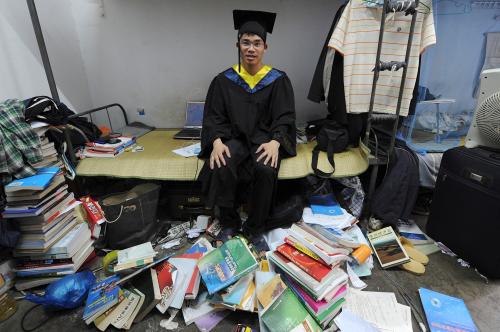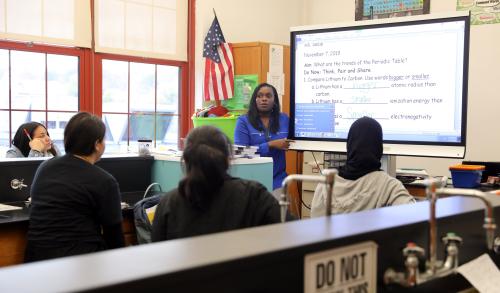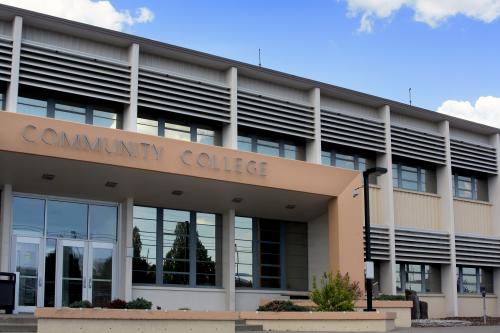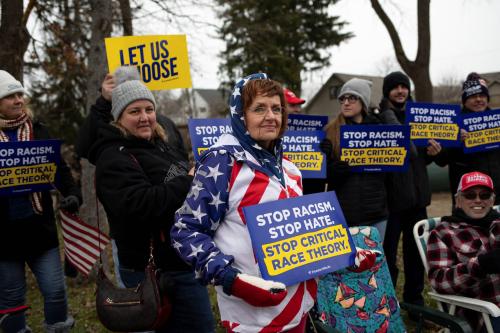The seriousness of low college graduation rates among first-generation and low-income college students cannot be overstated. Today, only 9 percent of students from low-income families earn a bachelor’s degree by age 24, compared to 77 percent of students from high-income families. Even more troubling, there has only been a slight increase in the number of college graduates from low-income families since 1970, when 6 percent obtained bachelor’s degrees. Bachelor’s degree attainment rates for first-generation college students—defined as students whose parent(s)/caregiver(s) don’t have a bachelor’s degree, and who may or may not be considered low-income—are also well below their continuing-generation peers.
Recent research in social psychology increasingly confirms what people from low-income and first-generation backgrounds have known and experienced for a long time: There’s more to the story than academic preparedness, financial aid, and uninformed parents.
For many low-income and first-generation students, the transition to college parallels a transition in social class where new challenges and questions can arise, such as: “I don’t belong here”; “Am I cut out for this?”; “My family thinks I think I’m too good for them now”; “I don’t know how to relate to my campus peers, they live a completely different life than me”; “I’m too nervous to talk with my professor.”
In this context, first-generation and low-income college students can struggle with nonacademic challenges that impact their academic lives. For example, students who identify with stigmatized groups often feel a lower sense of belonging on campus; low-income students are more likely to experience anxiety about communicating with faculty, staff, and campus peers; and first-generation students’ family members may perceive their transition to college negatively, which can cause a strain on their relationship that creates stress for the student.
Few programs hone in on these types of challenges that many first-generation and low-income college students experience, instead focusing on academics (writing help, remedial or developmental courses), finances (scholarships, FAFSA tutorials, coaching on how to budget), and “college knowledge” (time management, study skills, how to choose a major). These supports are important, indeed, but an emerging body of research also suggests that to effectively support first-generation and low-income students, we should not neglect their particular social and emotional needs.
Underlying the transition to a higher social class standing via college, which many first-generation and low-income students describe as straddling two worlds, is the psychology of social class. This growing area of research suggests a cultural mismatch between largely middle-class independent norms of American universities (where students “forge their own paths”) and largely interdependent norms of working-class, first-generation college students (which emphasizes community over the individual).
An individual’s perception of the self is also linked to social class, where lower-class individuals tend to have lower self-esteem and one’s subjective understanding of lesser relative wealth may influence negative self-evaluation. Further, first-generation college students report higher rates of guilt than their continuing-generation peers about leaving their families behind as they move to a higher social standing, which may negatively impact their transition and adjustment to college, as well as their well-being and social relationships. While the psychology of social class doesn’t have solely negative implications for first-generation and low-income students—for instance, individuals from lower-class backgrounds have been found to have higher empathic accuracy—these beliefs and perceptions can hinder their academic success.
In light of this research, some organizations are creating interventions and supports for low-income and first-generation students targeted at providing social and emotional support. One such organization using psychology to improve outcomes for underrepresented, at-risk, and first-generation college students is The College Transition Collaborative. A collaboration of social psychologists, education researchers, and higher education practitioners, the collaborative partners with colleges and universities to help them better understand how psychologically-informed practices can help their students excel. In partnership with PERTS, the collaborative developed a social-belonging intervention for underrepresented college students that shows promising results for first-generation students’ enrollment and GPA.
Our organization, Propeller Collective, aims to support first-generation and low-income students by honing in on psychology and social-emotional skill development specific to the college environment. An early-stage nonprofit, our work is based on research in social psychology and an intuitive understanding of first-generation and low-income college student experiences. We help students make progress on their college goals by sharing practical advice on nonacademic topics while nurturing the sense that they’re never alone—or the first—as they work toward their bachelor’s degree.
A free resource hub and community for first-generation and low-income college students, we publish content on our website that students can use right away, including recent articles such as “‘Am I Supposed to Be Here?’ When You Feel Like an Impostor on Campus,” “Guilt About Succeeding,” and “How to Email Your Professor (w/ Sample Emails!).” And we are currently piloting a campus-specific community with a small group of students at a large, public research university in the Midwest. Through in-person meetups, events, and social media, students find an opportunity to connect socially with others from similar backgrounds, express challenges and strengths related to being a first-generation or low-income college student, and seek guidance from older first-generation and low-income students and alumni. All of our work is grounded in an understanding of psychological interventions, such as difference-education, reducing stereotype threat, values affirmation, and social-belonging.
Ultimately, Propeller Collective’s goal is to help first-generation and low-income college students build skills and social networks and capitalize on strengths that will propel them to college graduation and pave the foundation for making connections to future opportunities.
Approximately 24 percent of the undergraduate population, or 4.2 million college students in fall 2017, may be considered low-income, first-generation students. (Since not all first-generation students are low-income, the number of first-generation students is even higher.) While it’s true that not everyone has to go to college, the possibility of social mobility for low-income, first-generation college students is remote when only 1 in 10 of them make it to college graduation.
To help more students persist to a bachelor’s degree, emerging research in social psychology offers a promising tool. Propeller Collective believes that tapping into this research and helping students to better navigate the social class transition will promote positive outcomes in persistence, quality-of-college experience, and ultimately graduation for first-generation and low-income college students.






Commentary
Using social psychology to help first-generation and low-income students through college
October 26, 2017